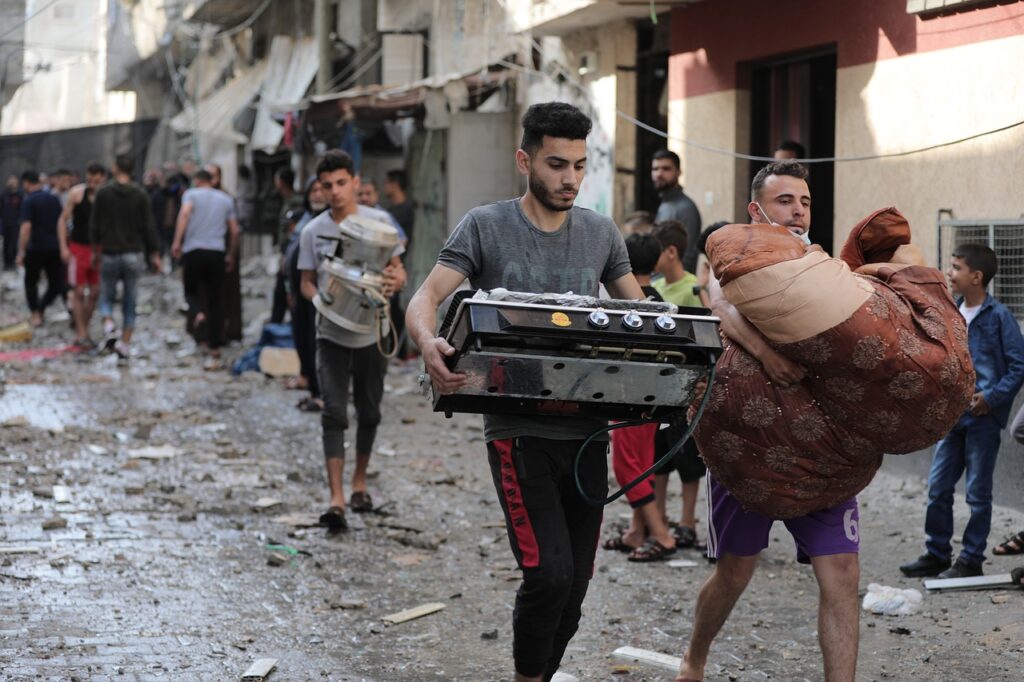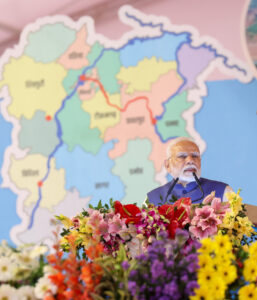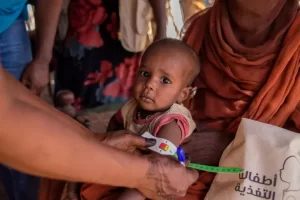
New York: Repeated evacuation orders by Israel have upended a whole lifesaving humanitarian hub that was set up in Deir al Balah, the United Nations Office for the Coordination of Humanitarian Affairs (OCHA), claimed.
Staff of the World Food Programme (WFP) in Gaza were compelled to relocate to other UN premises after being forced to leave their offices and guest houses in Deir al Balah.
Water production in Deir al Balah had been reduced by 85 per cent due to the loss of access to water sources in areas designated for evacuation earlier in August 2024.
The evacuation from Deir al Balah followed the evacuation of the Rafah hub back in May 2024, and according to Stéphane Dujarric, Spokesperson for the United Nations Secretary-General, it severely impacted the UN’s ability to deliver essential support and services.
In addition to the loss of warehouses and other humanitarian premises due to evacuation orders, it remains difficult to move around the south of Gaza due to the severe overcrowding and continuous displacement, Dujarric said.
OCHA reports that the UN humanitarian partners yesterday distributed tents to be used as temporary shelters in response to the latest evacuation orders in Gaza. However, stocks were running out and supplies were limited, it added.
The World Food Programme (WFP) said that their operations were severely hampered by the intensifying conflict, the limited number of border crossings and damaged roads. In the last two months, WFP could bring in only half of the 24,000 metric tons of food aid required for operations serving 1.1 million people in Gaza. WFP also had to reduce the contents of food parcels.
Shell craters and debris were making driving slow and challenging for truck drivers even in dry weather, and the WFP claimed that aid workers grappled daily with slow authorizations and frequent refusals when they asked for permission to move. Looting and public order problems were also frequent, especially when convoys waited for hours at holding points. It is further feared that when the rain comes in two months and flooding is expected, most roads will become unusable.
OCHA said the access of humanitarian partners to northern Gaza was particularly challenging as it required coordination with the Israeli authorities and passage through an internal checkpoint. The plans to fuel hospitals in that area had now resulted in access being denied five times in the past week, leaving some hospitals without new provision of fuel for over ten days. The dependency on fuel to run backup generators was complete as the Israeli authorities cut electricity provision from the Gaza Strip back in October.
On the health front, following the delivery of polio vaccines into Gaza, UN humanitarian partners on the ground were now positioning them in 11 health centres and training over 1,000 medical workers and volunteers who will participate in the campaign.
After the first confirmed case of polio, UN partners on the ground reported at least 50,000 children born since the crisis began were highly unlikely to have received any immunizations due to the collapse of the health system in Gaza.
UNICEF confirmed that 1.2 million doses of the Polio Vaccine Type 2 were brought into Gaza to immunize more than 640,000 children, together with the World Health Organization and the United Nations Relief and Works Agency for Palestine Refugees in the Near East (UNRWA).
Meanwhile, on the West Bank, OCHA was worried that people there were increasingly exposed to deadly attacks. Yesterday, five Palestinians in Nur Shams refugee camp were killed in an Israeli drone strike. They were among over 100 Palestinians killed by airstrikes in the West Bank since October 7, 2023, including over 30 this month alone.
Following yesterday’s escalation, peacekeepers in the United Nations Interim Force In Lebanon (UNIFIL) continue to observe exchanges of fire across the Blue Line. As UNIFIL continues to carry out its mandate in these challenging circumstances, the UN Special Coordinator for Lebanon, Jeanine Hennis-Plasschaert, and the Head of the peacekeeping mission in Lebanon, Lieutenant General Aroldo Lázaro, continue their contacts with the parties to de-escalate the situation.
The ongoing conflict continues to severely impact civilians on both sides of the Blue Line. “Along with our partners, we continue to scale up relief efforts in support of the Lebanese Government-led response. However, humanitarian response efforts are being undermined by funding constraints, and we urgently need additional resources,” Dujarric said. He added: “We call on all parties to follow and to abide by their obligations under international humanitarian law, emphasizing the need to protect civilians, including children, and civilian infrastructure at all times.”
UN Secretary-General António Guterres said the significant increase in the exchanges of fire across the Blue Line put both the Lebanese and Israeli populations at risk, as well as threatening regional security and stability, urged the parties to “urgently and immediately return to a cessation of hostilities and fully implement resolution 1701 (2006)”.
It may be mentioned that Resolution 1701 calls for the full cessation of hostilities, the deployment of Lebanese forces to Southern Lebanon, the parallel withdrawal of Israeli forces behind the Blue Line, strengthening the UNIFIL to facilitate the entry of Lebanese Forces in the region and the establishment of a demilitarized zone between the Blue Line and the Litani River. It also calls for the UN Secretary-General to develop proposals to implement the relevant provisions of the Taif Accords that seek to end the Lebanese civil war, as well as relevant Security Council Resolutions [1559 (2004) and 1680 (2006)] and impose an arms embargo on Lebanon.
– global bihari bureau
Image by hosny salah from Pixabay





